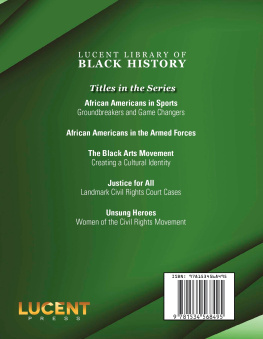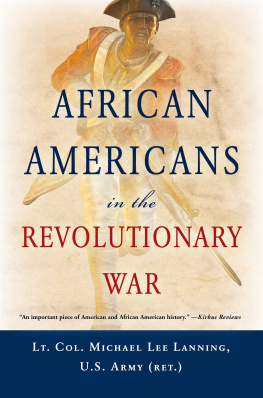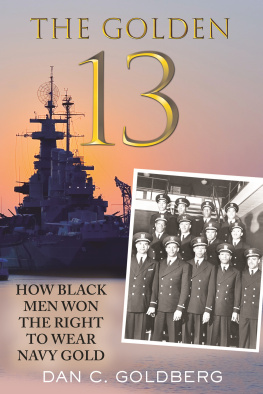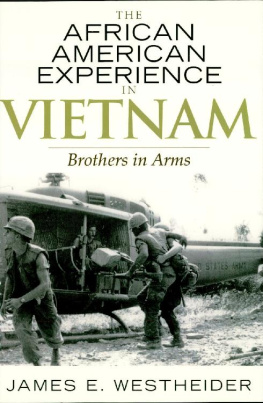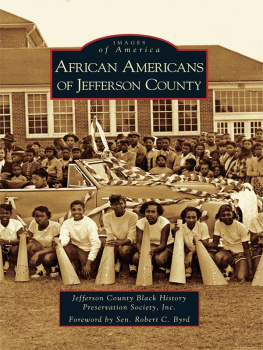THE BLACK OFFICER CORPS
The U.S. Armed Forces started integrating its services in 1948, and with that push, more African Americans started rising through the ranks to become officers, although the number of black officers has always been much lower than African Americans total percentage in the military. Astonishingly, the experiences of these unknown reformers have largely gone unexamined and unreported, until now.
The Black Officer Corps traces segments of the African American officers experience from 19461973. From generals who served in the Pentagon and Vietnam, to enlisted servicemen and officers wives, Isaac Hampton has conducted over seventy-five oral history interviews with African American officers. Through their voices, this book illuminates what they dealt with on a day to day basis, including cultural differences, racist attitudes, unfair promotion standards, the civil rights movement, Black Power, and the experience of being in ROTC at Historically Black Colleges. Hampton provides a nuanced study of the people whose service reshaped race relations in the U.S. Armed Forces, ending with how the military attempted to control racism with the creation of the Defense Race Relations Institute of 1971. The Black Officer Corps gives us a much fuller picture of the experience of black officers, and a place to start asking further questions.
Isaac Hampton II is the U.S. Army South Command Historian at Fort Sam Houston, Texas and Adjunct Professor of History at San Antonio Community College.
THE BLACK OFFICER CORPS
A History of Black Military
Advancement from Integration
through Vietnam
Isaac Hampton II
First published 2013
by Routledge
711 Third Avenue, New York, NY 10017
Simultaneously published in the UK
by Routledge
2 Park Square, Milton Park, Abingdon, Oxon OX14 4RN
Routledge is an imprint of the Taylor & Francis Group, an informa business
2013 Taylor & Francis
The right of Isaac Hampton II to be identified as the author of this work has been asserted in accordance with sections 77 and 78 of the Copyright, Designs and Patents Act 1988.
All rights reserved. No part of this book may be reprinted or reproduced or utilized in any form or by any electronic, mechanical, or other means, now known or hereafter invented, including photocopying and recording, or in any information storage or retrieval system, without permission in writing from the publishers.
Trademark notice: Product or corporate names may be trademarks or registered trademarks, and are used only for identification and explanation without intent to infringe.
Library of Congress Cataloging in Publication Data
Hampton, Isaac.
The Black officer corps : a history of Black military advancement from integration through Vietnam / by Isaac Hampton II.
p. cm.
Includes bibliographical references.
1. United StatesArmed ForcesAfrican American officersHistory20th century. 2. African American soldiersHistory20th century.3. United StatesArmed ForcesAfrican American troopsHistory.
4. United StatesRace relationsHistory20th century. 5. African AmericansCivil rightsHistory20th century. I. Title.
UB418.A47H36 2012
355.3320899607309045dc23
2012033035
ISBN: 978-0-415-53189-4 (hbk)
ISBN: 978-0-415-53192-4 (pbk)
ISBN: 978-0-203-08189-1 (ebk)
Typeset in Bembo
by Wearset Ltd, Boldon, Tyne and Wear
CONTENTS
ACKNOWLEDGMENTS
This book is much better than it would have been if I had not had the guidance, support, and tutelage from many people. First, I must thank my friend and mentor Douthard (D.R.) Butler for the use of his private collection of rich documents that was used to write major portions of this book.
The oral history interviews of officers, non-commissioned officers, military wives, and civilians is at the heart of this project. My deepest appreciation and thanks to all of my interview subjects who shared not only their experiences from a very uncertain time, but also their spirit and soul. They were all a joy to work with. Without the vast knowledge they shared with me concerning the inner workings of the armed forces and social climate of the country during the Vietnam era, this book would have far less depth and scope. These individuals have my sincere gratitude and respect, not only for serving the country with honor, but also for enthusiastically providing me with additional sources and ideas for future research.
Special thanks to Joseph Pratt, who greatly helped my writing skills and trained me how to conduct oral history interviews while working at the Houston Review. In addition, Joe provided funding that enabled me to conduct research during my graduate studies at the University of Houston. My earliest supporters were Cary Wintz and Merline Pitre who encouraged me to pursue this topic while I was completing my masters degree under their guidance at Texas Southern University. Thanks to both of you for seeing the potential of this topic in its nascent stages.
I am forever indebted to Robert Buzzanco, my co-dissertation advisor who became a true friend. Bob taught me so much about the Vietnam War and pushed me to become a stronger researcher by reminding me to always consider the economic component when studying history. To my other co-advisor at the University of Houston, Gerald Horne, many thanks for your tutelage and suggestions for this books content and sharing personal stories of the Black Power Movement. For reasons known to them I am also grateful to: Dr Louis Browne, Ernest Solomon, Larry Smith, David Drake, Joel Joseph, Wilbert Oliver, Charles Ragston, and J.R. Wilson. Many thanks to Colonel Clinton Fields (retired) who was one of my interviewees, read several chapters during the writing process, and brought more clarity to the analysis based on his experience as an officer. With much appreciation I am grateful to project managers Claire Toal and Allie Waite at Wearset Ltd whose infinite tact, patience, and suggestions made this a much better book.
The birth of my daughter Irixa during the middle of the writing process made life quite interesting. This little girl has brought a joy to my life I have never known. From a place in my heart only she knows, deepest thanks to my wife Roxana who has supported me enthusiastically through this process.
Finally, a few words on who this book is dedicated to, my grandmother Ernestine Suggs, who raised me from when I was age three. While she did not live to see me finish my graduate work at Texas Southern and the University of Houston, she is largely responsible that I did not quit. The value system she instilled in me as I grew into adulthood centered on having a can do attitude and often hearing the sometimes annoying phrase of if life gives you lemons make lemonade, when I did not get exactly what I expected in life. Collectively, this and many other things she taught drove me to see this project through to its fruition with a smile.
The strong example this woman set for me not to give up has a direct correlation to the stories she told me of when she was a domestic worker for a wealthy white family in the 1930s and then changing her position in life later by going on to graduate from Wilberforce and Wittenberg University respectively. Ultimately, she retired as an elementary school teacher. The tragic loss of her only daughter, then choosing to raise me when she was nearly age sixty, and never once complaining about her situation had an indelible impact on me. My love and admiration for her are immeasurable. While not here physically, somehow I know she has helped me stay the course.



